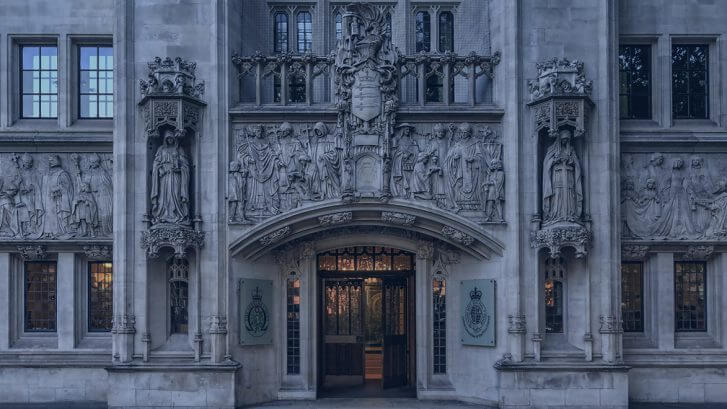In October 2020 the Supreme Court heard the appeal in R (KBR Inc) v Director of the Serious Fraud Office (see previous summary article). The appeal focussed on whether the SFO could issue a notice under section 2(3) of the Criminal Justice Act 1987 (“the CJA 1987”) to a foreign company requiring it to produce documents held abroad (“the s2 Notice”). The Supreme Court has now ruled that a SFO s2 Notice does not have extraterritorial effect in what many practitioners and commentators will welcome as a victory for common sense and respect for the comity of nations. That is an entirely unsurprising result given the well-established position generally limiting to the UK the application of legislation emanating from the UK Parliament.
Background
KBR Inc (“KBR”), a US-incorporated company, had previously challenged the validity of the s2 Notice served on one of its officers at a meeting with the SFO in the UK to discuss the SFO’s investigation of its subsidiary, KBR Ltd (a UK company). The s2 Notice required KBR to produce documents held abroad. In September 2018, the High Court rejected KBR’s challenge to the s2 Notice, primarily on the basis that section 2(3) of the CJA 1987 (“section 2(3)”) had extraterritorial effect and extended to foreign companies in respect of documents held outside England and Wales, provided there was a ‘sufficient connection’ between the company and the jurisdiction.
The High Court’s ruling meant that the SFO, and by extension other law enforcement agencies in the UK, could utilise their compulsory powers under domestic laws to compel foreign companies to produce material held abroad under pain of criminal penalty, rather than relying on the slow but conventional mutual legal assistance (“MLA”) route. This ruling represented a significant and surprising development of the law, especially since the CJA 1987 itself contains no reference to a ‘sufficient connection’ test. Unsurprisingly, KBR appealed this decision to the Supreme Court.
The Supreme Court’s judgment
In reaching their unanimous conclusion, the Supreme Court took as its starting point that domestic legislation generally does not have extraterritorial effect; if it were to do so, then Parliament would ordinarily make that explicitly clear. Whilst in certain circumstances Parliamentary intent to give legislation extraterritorial effect could be implied, the Supreme Court found that the CJA 1987 contained no sufficiently clear indication, either for or against extraterritorial effect.
In order to determine whether this implied intention existed for section 2(3), the legislative history of the CJA 1987 (including the Roskill Report which led to it) would need to be considered. The Supreme Court ruled that:
“There is…nothing in the Roskill Report which recommends the creation of a statutory power which would permit UK authorities unilaterally to compel, under threat of criminal sanction, the production in this country of documents held out of the jurisdiction by a foreign company. On the contrary it emphasises the importance of establishing reciprocal arrangements for obtaining evidence from abroad.” [own emphasis]
The Supreme Court found that the background to the CJA 1987 (and subsequent legislation relating to the UK’s participation in MLA in criminal proceedings and investigations) supported KBR’s case that section 2(3) did not have extraterritorial effect. Lord Lloyd-Jones held at paragraph 45:
“It is to my mind inherently improbable that Parliament should have refined this machinery as it did, while intending to leave in place a parallel system for obtaining evidence from abroad which could operate on the unilateral demand of the SFO, without any recourse to the courts or authorities of the State where the evidence was located and without the protection of any of the safeguards put in place under the scheme of mutual legal assistance.”
Further, the Court found that legislation it had considered in its decision in Serious Organised Crime Agency v Perry [2013] 1 AC 182 – which held that a disclosure order under section 357 of the Proceeds of Crime Act 2002 could not be made against persons outside the jurisdiction – was of “striking similarity” to section 2(3). Given that striking similarity, the reasoning of Perry was therefore “strongly supportive of the view that section 2(3)…was not intended to confer a power to require disclosure by a foreign person abroad.”
The ‘sufficient connection’ test was resolutely rejected by the Supreme Court:
“…there is no warrant for such a broad reading of section 2(3)…In particular, such a reading would be inconsistent with the Parliamentary intention as evidenced by the scheme and history of the legislation. Secondly, section 2(3) confers a power not on a court but on the SFO. As a result, there is no scope here for limiting the operation of a broad interpretation or safeguarding against exorbitant claims of jurisdiction by the exercise of judicial discretion. Thirdly, a statutory rule which empowers the SFO to demand the production of documents by foreigners outside the jurisdiction when there is a sufficient connection between the address and the jurisdiction, without defining what would constitute such a connection, would be inherently uncertain. Fourthly, there is no basis for the implication of such a limitation and any attempt to do so would exceed the appropriate bounds of interpretation and usurp the function of Parliament. As Hughes LJ put it in Perry, to do so would involve illegitimately re-writing the statute.”
Analysis
The Supreme Court’s reasoning is to be welcomed for clarifying that the question of the territorial extent of legislative provisions is to be determined by Parliament’s express intentions, not the judiciary. The fact that many of the SFO’s investigations relate to companies or events outside the UK, necessitating an ability to obtain material from abroad, does not justify interpreting domestic legislation in a manner irreconcilable with the Parliamentary intent underpinning it, nor in a way that is inconsistent with principles of international comity. It is apparent that the Supreme Court was concerned to avoid a situation whereby a law enforcement agency could unilaterally demand information from outside the jurisdiction, without judicial oversight, safeguards or oversight by the foreign jurisdiction concerned, especially if this was achieved by introducing a test (‘sufficient connection’) not provided for by statute and which could not be inferred.
The practical impact of this decision will remain to be seen. It is obviously a setback to the SFO’s attempts to obtain evidence held overseas without using the MLA process but, in reality, until the first instance decision it had never been contemplated that its section 2 powers enabled it to compel a foreign company to produce documents held abroad. Further, insofar as the SFO have taken advantage of the first instance ruling, that route is now closed. Foreign companies under investigation by the SFO will now know that the SFO cannot compel them to produce documents held overseas, but they will still need to be mindful that, in the context of Deferred Prosecution Agreements, cooperation is a public interest factor tending against prosecution, with cooperation defined in the SFO’s Corporate Cooperation Guidance as “…providing assistance to the SFO that goes above and beyond what the law requires.” In all likelihood, a company’s decision as to whether to cooperate will likely depend upon an assessment of the extent to which its exposure is readily apparent to the SFO from evidence already available to it, but the company will now have to factor into this analysis the fact that the SFO will have to use the slow, and not always straightforward, process of using MLA if it needs evidence from overseas to build its case.
In the European sphere the Supreme Court’s decision represents a blow to any mitigation of the SFO’s inability to obtain a European Investigation Order post-Brexit, although little thought appears to have been given to how extraterritorial use of section 2 would have been consistent with the UK’s obligations to other sovereign states and MLA arrangements agreed with them. But it is to MLA the SFO must now turn, noting that new powers to obtain Overseas Production Orders, presently only available in respect of data held by companies operating in the US, have yet to be commenced.
In light of the judgment, the question is whether there exists any governmental appetite for explicit legislative powers to obtain material from abroad, and for which the SFO may now feel compelled to push. Such a step would seem to run counter to a return to traditional MLA, seen very recently in last December’s EU Withdrawal Agreement, and would need to deal with the practicalities of exercising a UK statutory power overseas (especially where it is sought against a company or individual that otherwise has little connection to the UK). Watch this space.




